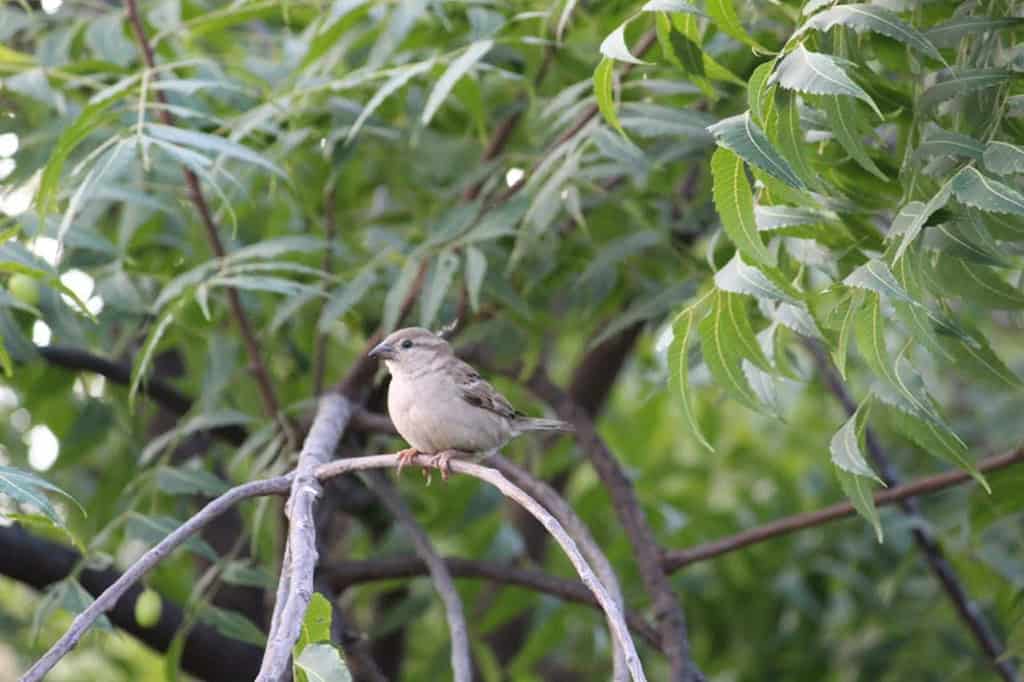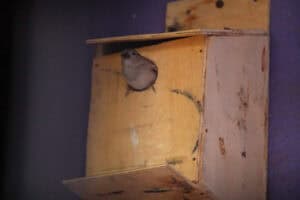Koodugal NEST is a non-governmental organisation based in Chennai, which focuses mainly on the conservation of sparrows. Why sparrows in particular? Sparrows are insectivorous and hence play a crucial role in pest control, especially mosquitoes, flies and insects which damage crops. They also control the population of grasshoppers, protect crops and promote agricultural productivity. They play a key role in seed dispersal as well, which is essential for maintaining biodiversity. The population of sparrows has been declining slowly, due to various reasons including urbanisation, loss of green spaces, and use of pesticides.
Ganeshan, a native of a small village near Krishnagiri, grew up surrounded by nature and developed a deep affection for sparrows. Over time, he noticed their numbers declining and felt compelled to act. While pursuing his bachelor’s and master’s degrees in mechanical engineering at Sri Venkateshwara College of Engineering in Chennai, he met Dr. Murugavel – a passionate environmentalist whose work in tree planting and bird conservation left a lasting impression. He took a survey to check the areas in which sparrows existed in the city, during his student years. Inspired by his professor, Ganeshan founded a trust focused on sparrow conservation, aiming to protect the species and promote ecological balance through community awareness and action.
After completing his master’s degree, Ganeshan began his career as a professor at SRM University. Even then, his commitment to environmental issues remained strong. Eventually, he transitioned into the IT sector, but found the work unfulfilling. His heart remained with nature and conservation. Though he continues to work in IT, Ganeshan dedicates his weekends to his true passion. Balancing both roles, he manages to pursue what matters most to him – protecting the environment.
This marked the beginning of Koodugal Trust – a Chennai-based NGO. It focuses on building nests for sparrows and providing them with a good habitat, which would lead to an increase in their population.

A sparrow returns to North Madras, thanks to Koodugal’s community conservation.
The early stages of Koodugal began in his student years back in 2014, when he had made it a mission to plant at least 500 trees per year. He wanted to give back to nature in whatever way possible. In 2020, Ganeshan and his wife Shanthini officially registered Koodugal as a trust, marking the beginning of their journey to make a significant change in the environment. Ganeshan says that the main objective of their NGO is “to distribute one lakh nest boxes all over Chennai”. He wants to make sparrows a common sight and significantly increase the sparrow population. This is done by educating school children and communities about the importance of sparrows and also getting them to construct the sparrow nest boxes.
The primary objective of Koodugal (NEST – Network for Environment Sustainability Trust) is to restore and support the natural habitat of sparrows. The first nest boxes were issued in Dhanalakshmi Higher Secondary school situated in Royapuram. In North Chennai, this initiative has yielded commendable results, contributing to a noticeable increase in the local sparrow population. But this journey was not easy.
Ganeshan and Shanthini faced a lot of challenges when they wanted to implement this idea of theirs in schools in the initial stages. People were sceptical, mostly because they weren’t aware of the ways in which a sparrow was helpful to the environment. Ganeshan found it difficult to convince the locals of North Chennai and explain to them the importance of conservation of sparrows. The first time they approached a school, they faced rejections. They found it difficult to obtain permission to install the nest boxes from the authorities. They even had to wait hours together just to meet the headmasters. After a whole lot of persistence, and getting help from his students, they reached out to nearly 10 schools and gained media attention. Other schools were welcoming of the project and were ready to actively work with them for conserving sparrows.

Koodugal provides safe nests for sparrows to lay eggs and hatch their young.
Initially, carpenters were hired to construct the nest boxes, with each costing between Rs. 200 and Rs. 250. However, Ganeshan soon took a different approach. He began sourcing raw materials from local markets himself and involved school children in assembling the boxes. A dedicated team takes care of the initial pre-processing tasks, such as marking the layout and cutting the materials needed for the nest boxes. Once these preparations are done, the children are trained to assemble the boxes themselves. This efficient system has helped lower the production cost of each nest box to Rs. 170. The move not only brought down expenses but also gave students a hands-on role in the initiative. As they worked together to build the boxes, the children developed a strong sense of ownership and responsibility. Their involvement extended beyond construction – they became active participants in the effort to protect sparrows and contribute to maintaining ecological balance in their community.
Over the past few years, Koodugal has distributed more than 12,000 nest boxes across 45–50 schools and gated communities in Chennai. They have installed nest boxes in the car parking area of an apartment located near the Tondiarpet metro. Many sparrows can be spotted there. The sparrows use the nest boxes to lay their eggs and for hatching. They stay in the boxes for no more than 15 days after hatching, using them primarily to feed their chicks. An interesting fact I learned after personally visiting the gated community in Tondiarpet is that both male and female sparrows are involved in feeding the chicks. This is contrary to the common assumption that mothers are responsible for feeding while fathers build the nest. In reality, both male and female sparrows participate in feeding the chicks and building the nest, creating a safe space for their offspring.
In the past 4 years, the sparrow populations have increased by 20 per cent in North Chennai. Sparrows, once spotted only in parts of North Chennai, are now also being seen in areas like Velachery, Tambaram, Perungalathur, Anna Nagar, and Koyambedu. It has received widespread recognition from the general public across various states in India, particularly after Prime Minister Narendra Modi mentioned the trust in an episode of Mann Ki Baat and praised their efforts to conserve sparrows. Koodugal NEST also gained corporate support from Chennai Willingdon Corporate Foundation, Lennox India Technology and SurveySparrow Private Limited, who have been helpful in funding and distribution of the nest boxes, ensuring continued growth of the initiative.
In addition to sparrow conservation, the Koodugal Trust is currently involved in eight other projects, such as waste management, water management, biogas, string art, and so on. One notable initiative is the installation of biogas plants – so far, they have successfully set up 10 such units in the Krishnagiri district.
The trust also works closely with Sri Lankan refugees, students, and women through various empowerment programs. One such initiative is a skill development program centred around String Art, which involves hands-on training to create handmade products using eco-friendly materials like wood instead of plastic. This program is especially targeted at refugees living in camps across Tamil Nadu, who often cannot seek employment outside. String Art offers them a meaningful way to spend their time while also generating an income to support themselves.
“Explore Yourself” is another project which helps people discover and share their hidden talents by offering a free platform to showcase their skills on social media and also on the official website of Koodugal, encouraging self-expression and confidence. Other initiatives include waste management and farming. As part of their recycling efforts, they collected around 9,000 used ballpoint pens from schools, transformed them into pen stands, and returned them to the same schools. In their farming project, they cultivate paddy, mangoes, coconuts, and other crops on a 5-acre plot of land, donating 50 per cent of the total revenue to support individuals with disabilities.
Ganeshan believes that we should avoid interfering with the natural feeding habits of any living creature. Instead of offering them food, he suggests providing a safe space for nesting and allowing them to find their own nourishment. While many people tend to feed animals like cats, dogs, and birds, he emphasises the importance of letting them live independently and obtain food on their own. This will help them live in balance within their environment.
A new mobile application is currently being developed to aid in tracking the real-time locations of sparrows. The app will allow users to take photos of sparrows they come across and upload them directly. Once uploaded, the app will use the location data from the images to help identify areas where nest boxes can be installed, ensuring better support for the birds. It will also monitor the nest boxes that have already been distributed, particularly those placed in schools, helping to coordinate and strengthen the overall conservation effort. This initiative is a remarkable example of how technology can enhance environmental conservation efforts. In addition to the app, Ganeshan has plans to establish a bird sanctuary on his own land in Krishnagiri and to expand the sparrow conservation project to various other states across India. These initiatives are in development and are expected to take shape in the near future, once there is enough manpower and sufficient funds. Ganeshan has a clear vision and is steadily working toward bringing it all to life.
Ganeshan has an important message for young individuals who are passionate about environmental conservation or those considering starting their own non-governmental organisation: achieving success in these fields requires immense passion, perseverance, and dedication. Very few people are able to turn these efforts into success stories, and many seem to face significant challenges and setbacks along the way. It is essential to be prepared for failure and, more importantly, to have the strength and resilience to rise above it and continue pushing forward. Furthermore, Ganeshan strongly encourages individuals to plant as many trees as possible. He emphasises the need to truly understand the invaluable role trees play in our environment, not just in the intense heat of summer, but throughout the entire year. Recognising their importance is crucial for ensuring a healthier, more sustainable future for all.